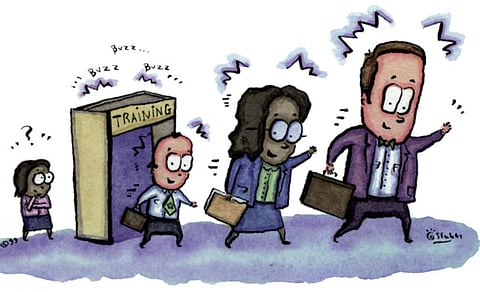Prep for professionals
UAE universities must help students understand work culture and hone their skills before they step into the office

Local business leaders and university officials warn that graduates from universities across the UAE are ill-prepared for the workforce and have unrealistic employment expectations.
An entry-level employee at the government-owned Abu Dhabi Investment Authority can expect to earn Dh22,042 per month, according to Payscale.com. But these positions are becoming increasingly difficult to get — just last month the Department of Transport received 950 applications for 60 positions. Mohammed Faithi, CEO of The Media Company, a multimedia production company in Abu Dhabi, says many graduates he has seen lack the etiquette and know-how that is necessary to do business today. “We often find that not only do we have to teach graduates from the ground up,” says Faithi, “but that they also have high expectations of salary and required work hours.”
Unrealistic expectations
This is unrealistic, Faithi says. “No one is going to pay you a huge salary if you’ve just graduated.” The average entry-level salary at The Media Company is Dh2,000–3,000 per month.
Faithi says fresh UAE graduates require a lot of training to make them competent. He says that it takes roughly six months to train novices from UAE universities while their counterparts from London and New York grasp the same concepts in half the time. “There is a lot of work at the grass-roots level that we need to do to prepare them for the corporate world,” he adds.
Melodena Balakrishnan, Associate Professor of Marketing Strategy, University of Wollongong in Dubai, says it is important for companies to invest in rookies. “If you hire someone and ask them to start running they’re probably going to run in the wrong direction.”
Michael Rjeily, Director of the Centre for Career Planning & Placement at United Arab Emirates University (UAEU), says that the university offers services to prepare students for employment but many have high expectations. “Students perceive that by being employed in governmental organisations you receive a substantially higher salary compared to the private sector. That’s why you find many grads searching for jobs in the government sector,” he says.
People must understand that the job market is getting more competitive, says Rjeily. He adds that students should engage in extracurricular activities to help prepare for the workplace.
Investing in people
Arnaud Verchère is the Founder and Head of Strategy at Tonic International, a global marketing communication agency based in Dubai. He says that people need much more than education to prepare themselves for the workplace. “They need to understand the culture and the region, and they have to have the right passion, this outweighs the university they come from.”
Twenty-two-year-old Palestinian Belal Hammad Mahmoud Abu Kabbash is studying Mass Communication at UAE University. He does not feel prepared for the workforce but believes that the onus does not rest on the university. “It’s 50 per cent on the university and 50 per cent on the person themselves,” he explains. “Students need to be tried and tested in their field, they cannot just rely on the university to find them a job.”

![Social media claims of cancellations dismissed; official updates to be shared through authorised channels. [Illustrative image]](http://media.assettype.com/gulfnews%2F2025-11-15%2Fx2mp12df%2Fexam.jpg?w=320&auto=format%2Ccompress&fit=max)

